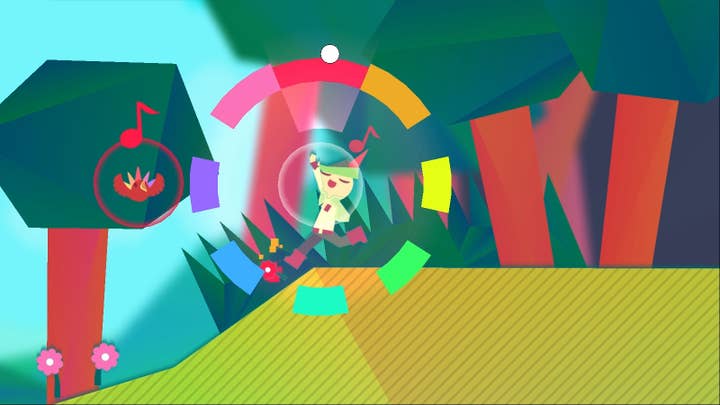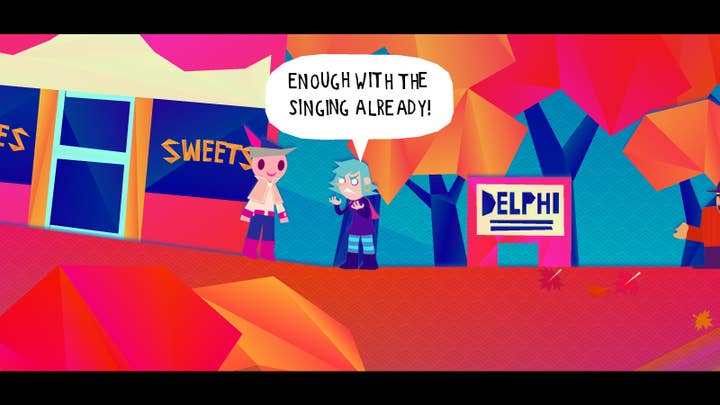"It felt like the reality of the world was fighting against this game"
Greg Lobanov talks about trying to make the relentlessly positive Wandersong during relentlessly turbulent times
Wandersong begins in the finest video game tradition. Players are dropped into the protagonist's shoes without preamble or prompting, and they move to the next screen, where they find a sword the size of their own character ready and waiting for them.
But Wandersong is not The Legend of Zelda, and its heroic bard is not as deft with a blade as Link. The protagonist struggles to wield the sword, and the first enemy in the game knocks the weapon away with contemptible ease. At that point, the bard's only recourse is to sing, which doesn't exactly soothe the savage beast, but at least turns it into an angel who explains the whole fight was a test to identify the hero of prophecy (which the player most definitely is not).
"It has a really big emphasis on positivity, optimism, pacifism, non-violence, and empathy"
"The elevator pitch is that it's a game where you use singing to save the world," designer Greg Lobanov told GamesIndustry.biz last week. "There's really no game that's like that."
While he's heard comparisons to Paper Mario and Night in the Woods, Lobanov doesn't see those games as having much in common with Wandersong.
"It has a really big emphasis on positivity, optimism, pacifism, non-violence, and empathy," Lobanov said. "It's not just that it's a peaceful or happy game, but it includes a conversation about being that kind of way. It talks about violence in games a little bit. It talks about how other games solve problems, and then presents itself as the argument against that."
Other games may have a similar structure, control scheme, or look, Lobanov said, but he sees Wandersong as being particularly experimental when it comes to theming and narrative.

"I think what the story is about, what kind of characters are in it, the themes and messages and values it promotes, really stand out in the field of games. And that's what I think makes it more approachable to the average person," Lobanov said, adding, "The closest game I can think of that's in kind of a similar vein would be Undertale, which really dealt with big themes, violence, pacifism, and non-violent solutions. But our tone is wildly different. The inspirations are more like Steven Universe, Adventure Time, more coming from animation and comics and less from games."
While it's still early days (Wandersong debuted on Nintendo Switch and Steam September 27), Lobanov has seen the audience for Wandersong mirroring its inspirations.
"This game does a really good job of wearing its heart on its sleeve. People can see even a screen of this game and I think it's really clear to people what it's about, and they know whether they're in or out."
"It seems like it's had an impact on artist communities, webcomics," Lobanov said. "It's resonating in communities outside of games, and I think that's valuable. That's the kind of audience you want for this game."
That said, It seems to be resonating to a lesser degree with traditional audiences.
"For a game like this, I think the average Steam gamer kind of bounces off it because it's [colorful] and friendly and warm," Lobanov said. "And I don't think that's something the average Steam gamer is into. But it does really well with the Nintendo console audience."
Wandersong landed on the Switch bestseller list around launch, but failed to replicate that achievement on Steam's Top Sellers category. Fortunately, the Steam users who did pick the game up seem to enjoy it. Though it only has 75 user reviews on Steam as of this writing, 97% of them are positive.
"This game does a really good job of wearing its heart on its sleeve," Lobanov said. "People can see even a screen of this game and I think it's really clear to people what it's about, and they know whether they're in or out. It communicates a really clear tone and message, and that's really important nowadays. Moreso than ever, people are connecting to games through their story, their message, and their meanings. Our game has really clear values. It really naturally attracts people who are looking for that kind of media."

Lobanov launched Wandersong's Kickstarter campaign in January of 2016, explaining that the game had been inspired by a 5,000 mile bike ride across America.
"I slept outside, faced harsh conditions, and made friends with a lot of different people in a lot of different places," he said in the Kickstarter pitch for the already-in-development game. "For me, it was a lesson in what one can accomplish with optimism and a reassurance in the goodness of humanity."
We asked Lobanov what it was like working on a game with those themes in an era when the real world seemed to have abandoned them entirely.
"It's coming at a time when people are just desperate for media that's positive"
"When I started this game, it was around when Gamergate was kind of at its tail end," Lobanov said. "There was this feeling like, 'Wow, this crazy, fucked up, toxic thing going on in our industry was really weird. Glad that's over.' But there was still this weird feeling of distrust between people, and general depression. Everyone was feeling weird and unhappy with each other. I just felt that, right now, we needed something to build bridges again, to say, 'Let's remember that most people are actually really good.'
"At the time, it felt maybe slightly relevant to what was going on. Then as time passed, to me it felt like the game was more and more relevant in a way I really didn't expect. It's not really good that it became more relevant, but the game now feels like a way more crazy piece to make than it did three years ago when I started. And I didn't anticipate that at all, but I'm really glad to be making something that has this message right now.
"It's coming at a time when people are just desperate for media that's positive, that can give a hopeful vision for the future, but is also honest. We're trying to make a game that's happy through understanding rather than ignorance. We try to have a conversation and find optimism in that."
Lobanov admitting it was demoralizing at times to be working on a game like Wandersong when "it felt like the reality of the world was fighting against this game," but the game helped provide him with a positive outlet no matter how dark things felt.
"It wasn't easy, but I'm grateful that I had this reason to do something that wasn't easy," Lobanov said. "If I didn't have this game to think about and work on and try to filter the world through, I don't know if I would have come out the other side feeling as good as I do right now."








